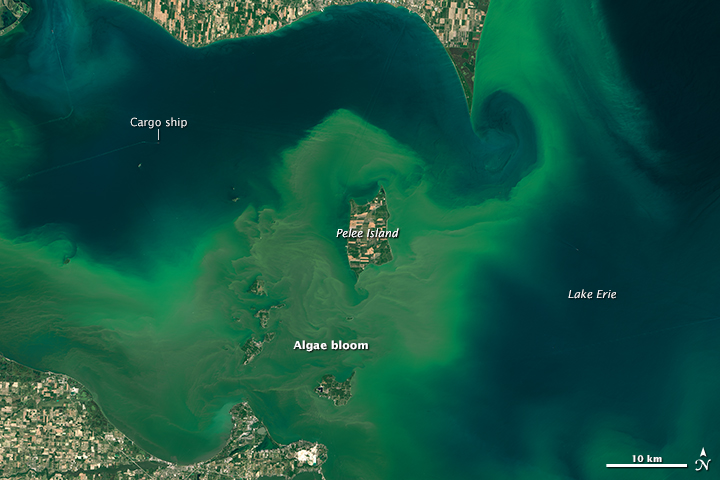From LAKE ERIE ADVOCATES
After 18 years of citizen complaints, appeals and lawsuits, a rural Wood County couple has finally won their fight to prove Ohio’s system of permitting factory “farms” is unlawful and they are hopeful the decision will put a stop to the escalating number of Confined Animal Feeding Operations (CAFOs), recognized as hazardous to Lake Erie because of the amount of their manure applied untreated on fields .
Vickie and Larry Askins, of Cygnet, Ohio received the news last month in a letter sent by the U.S. EPA Region 5 Administrator to the Director of the Ohio Department of Agriculture (ODA), stating there “is no reasonable expectation” that the state’s transfer of authority over CAFO permits from the Ohio EPA to the ODA, ongoing for the last two decades, will come into compliance with federal regulations.
Legally, Ohio needed the U.S. EPA to approve its request, but ODA went ahead without it, assuming control of permits to build, operate and expand CAFOs, now numbering over 200 in Ohio, including 60 in the Western Lake Erie watershed. As the number of CAFOs increased, the lake began suffering massive toxic algal blooms each summer fueled by Phosphorus in animal feces and urine.
In 2000, the Ohio legislature approved Sub. SB 141 , telling then-Governor Taft to ask the U.S. EPA to transfer CAFO permits and inspections from the Ohio EPA to the ODA. According to an Ohio Farm Bureau lobbyist the switch in authority was “…one of the most important bills we’ve worked on. We spent a tremendous amount of time trying to massage the bill and have it drafted the way it should be…”
In 2004, the ODA issued a draft permit for a factory farm with 1,765 cows and a 24-milliongallon manure pit less than one mile from the Askins’ home.
“After we started investigating these ODA permits,” Larry said, “we smelled something rotten since the ODA’s job was to promote agribusiness, whereas the Ohio EPA’s job was supposedly to protect the environment.”
In 2009, HB 363 expanded ODA authority over CAFO permits, while again acknowledging the authority could take effect only after U.S. EPA approval.
Meanwhile, the Askins, in conjunction with Wood County Citizens Opposed to Factory Farms, continued fighting a series of ODA-permitted CAFOs in their county with appeals to Ohio’s Environmental Review Appeals Commission. They also submitted a 200-page petition to Region 5 seeking to withdraw Ohio’s permitting authority, and filed a federal court lawsuit against the U.S. EPA, OEPA and ODA in August 2014, ironically, during the very time when a toxic algal bloom forced the City of Toledo to shut off water to 400,000 people for three days.
In 2015, former A.G. (now Governor) DeWine stated “…the rules adopted…by the ODA provide adequate legal authority…to…enforce a partial permit program for a major category of discharges in Ohio now covered under…the Ohio EPA.”
In 2018, Vickie filed a complaint alerting the U.S. EPA Inspector General about what she calls “Ohio’s invalid split permitting scheme.” The following year, the IG ordered Region 5 to either approve or deny the ODA’s transfer request because “the region’s longstanding delay on these issues has impacted federal and state oversight and has created regulatory uncertainty with respect to CAFOs in the state of Ohio.”
Despite DeWine’s 2015 certification that the ODA met all requirements, the U.S. EPA told Ohio in 2019 and 2020 it would have to make at least 81 revisions to their current statutes and rules.
ODA did not respond to either notice and on November 16, 2022, Region 5 informed the ODA Director there was “no reasonable expectation” that ODA would ever fix its program and finally declined Ohio’s transfer request .
But, based on long experience with regulators, Vickie warned, “Predictably, the ODA will say their program is still OK since they only issue ‘state’ permits to CAFOs that claim they will not discharge pollution. And the Ohio EPA will say their program is OK because they’ve been issuing the ‘federal’ CAFO discharge permits – which few Ohio CAFOs have. Given that this convoluted scheme has been going on for 22 years, both CAFO permitting programs need to be drastically overhauled and replaced.”
After 18 years battling governors, legislators and courts, the Askins urge people to “call Governor DeWine at 614-644-4357 and demand the termination of all illegal permits and a moratorium on all new ones. We believe this is a grave matter of public health, affecting literally millions of people, has been caused by Ohio’s obstruction of the law, resulting in damage to waterways and public health and multi-million dollar public expense to upgrade water treatment systems and roads.”





